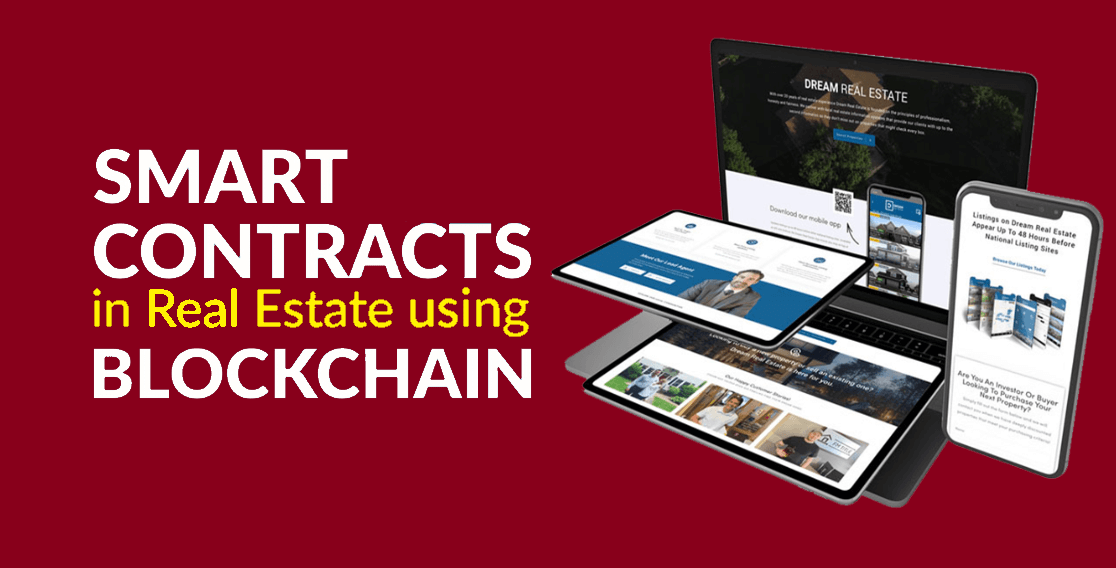Of late, various industries have adopted the culture of blockchain technology, and a considerable part of real estate has also explored the benefits of the blockchain. Blockchain integration for the real estate industry offers an unmatchable experience to the property owners and sellers that is missing in the traditional system.

We have witnessed how smart contract implementation in real estate brought a disruptive evolution to the global market. This pen and pencil business has taken a new turn with the arrival of blockchain. The new revolution can make business owners experience exceptional growth and the ease to work flexibly. All this attracts rising entrepreneurs to invest in the real estate business, and those already in the business are turning to the blockchain-based real estate business.
How Blockchain Technology Can Benefit the (IoT) Internet of Things
Introduction To The History of Blockchain Technology In Real Estate
Earlier, the real estate agents worked as the middleman between the buyer and seller. It was meant to build trust between both parties. The agent’s role was quite valuable as he is considered the expert on local laws/regulations. So, the buyers can check with him if the seller is the genuine owner of the property, and the sellers can confirm if the buyer has a genuine interest in the property and funds to buy it.
Whereas blockchain technology is gradually transforming the whole process. In 2018, it was the first time blockchain applications were seen in real estate transactions in Vermont. Now with blockchain smart contracts, the need for the third party is reduced, and the whole process becomes more transparent and convenient for both parties
Challenges and Opportunities in Decentralized Smart Contract Industry
Here Are The Amazing Real Estate Blockchain Benefits You Can Get
Improved Accessibility to Property Data
Users will have more control over their data with a blockchain-powered marketplace. Data manipulation is no longer possible on the website. The users will get more efficiency, and transparency, and reduce the costs. Also, international listings will get improved visibility.
Decreased Need Of Intermediaries
Both the parties, sellers and buyers, can easily interact with each other, so the intermediary’s role will be removed or decreased when influenced by blockchain networks.
Quick Background Checks
Blockchain technology offers multiple verifying parties that can verify the information fast. This method is quicker than the traditional one to verify the information.
Effortless Cash Flow Management
The whole process is automated based on smart contracts. It enables multiple stakeholders to coordinate with each other conveniently about distributing lease payouts and paying maintenance charges.
Better Decision Making
As the whole system is automated using high techs, the insights are generated by accurate data analysis and real-time data availability; the parties help make better decisions.
The Future Use Cases Of Blockchain For Cybersecurity
Challenges While Integrating The Blockchain Smart Contract in Real Estate
It is well known that when experts invent something big, it is not only meant to make their lives easier but also incorporates several big challenges and demands great effort. So same is with blockchain technology in real estate; it is a new implementation with huge challenges. Here we have outlined the top challenges that arise while integrating the blockchain into the real estate business.
1. New Wave To Explore
We all know that blockchain is a new trend, especially in the real estate business domain. Blockchain technology is still evolving, and experts are exploring more about it day by day. The process is quite complicated as professionals are still learning about its potential. Therefore, being a new wave in the IT industry, various barriers still need to be explored. It is the biggest challenge when incorporating blockchain networks for the first time.
2. Scaling
The real estate business is widespread, with billions of transactions executed globally every year. Therefore real estate business needs a wide and robust blockchain network to handle the volumes of transactions. If we take the example of the networks, Ethereum can handle 15 transactions in one second. On the other hand, Ripple-XRP is expected to perform 1500 transactions every second. Seeing the stat mentioned above, it is still difficult to achieve the required scalability with ultra-high processing speed in real time.
3. Chain Interoperability
Chain interoperability is another challenge that comes in the way while embracing the blockchain in the real estate business. Interoperability is the best factor that can decide the success or failure of the blockchain-based business domain. This issue makes it complicated for real estate firms to utilize the unique data present on the private and public Ethereum blockchain at one time and streamline the whole process.
Custodial Vs Non-Custodial Wallet
Top 3 Exciting Ways Blockchain Will Transform The Real Estate Industry:
1. Secure And Transparent Property Listing Services
Property dealing business traditionally was based on papers. There were old methods to keep track of the transactions and property listing. Those methods were not sufficient to maintain the records lifelong. Above all, users had to pay a great amount to avail of those services. In short, no central database was available to access the information and records. So, it is impossible to get the cross-references as the database is privately owned.
With blockchain-powered servers, the property listings are moved to the decentralized entities maintaining a secure database accessible to everyone. Blockchain-based DeFi solutions are best for making unbiased investments or buying calls. As everything is securely maintained with full transparency, no forgery of the data is possible.
Use of Smart Contracts in real estate
A smart contract is a self-executing digital agreement between the seller and buyer. The terms and conditions are written in the form of code stored on a distributed ledger and decentralized blockchain network. The smart contract execution is monitored by the blockchain codes. The transactions executed based on smart contracts are trackable and irreversible.
Instead of signing paper contracts, it is safe and fast to sign smart contracts. The following can be transformed in the form of smart contracts :
- Offer Sheets
- Letters of Intent
- Listing Agreements
- Closing Documents
All these above-mentioned can be digitized over the blockchain networks. The involvement of smart contracts avoids the need for brokers, bankers, and lawyers(third parties). As the track record is maintained safely and for the long term, the whole process becomes more legitimate.
Align the current state of IT with your business strategy by hiring the most trustworthy Blockchain Real Estate Development Company
Better Property Investment Options
Property investment business has time taking investment processes from the initial days. Even if you are investing in a single home or buying a multi-floor building, multiple parties are required to complete the process. Moreover, you should have a considerable bank balance to invest in the property business then.
However, with blockchain technology, people can buy the tokens of the property and have a co-owned property. Property tokenization allows partial ownership of the properties. With blockchain and smart contracts implementation, liquidity is also increased; the owners can sell/share their assets and buy the property in a faster and more affordable way. The reformed shape of the real estate business(decentralized) attracts more investors/buyers.
What Are The Different Blockchain Implications In Real Estate Business Domain?
Property Developers
As blockchain enables multiple ownerships and partial investment by multiple parties then a project can be started in less time and efficiently. Undoubtedly, partnership in property investment is nothing new, but the involvement of blockchain technology makes the process more streamlined and quick. The sponsors can ask for capital contributions from outsiders than the investors in their network with no worries about doing the daunting job of paperwork.
As everything is recorded on the ledger safely like architectural documents, appliance manuals, engineering plans, etc. Therefore, the investors, owners me, and every party in the process can access the data required readily available on the blockchain system. The transaction cost and time are also decreased which enables the developers to pay attention to the project’s development.
Property Owners and Investors
As the data corruption and duplication are almost reduced to zero, the owners/investors can trust the system and gain peace of mind. As the investors put their hard-earned money into the property business, they must get the reliability of the system and can rest assured about the legitimacy and transparency.
Real estate tokenization-(exchanging its value with crypto) results in a feasible liquidity facility. Liquidity is the factor that can convenience potential buyers and investors to indulge in crypto real estate.
Residents And Tenants
Blockchain technology lets renters enjoy a better living experience by enabling them to take virtual tours, submit rent payments securely, and much more. The technology ensures parties with the highest security by letting them know that their identities are verified, and personal information is fully encrypted. It is so much easier to move across the world because of the Blockchain’s potential to eliminate geographical barriers and data breaches.
Property Managers
Property management is not just about applying fresh paints or replacing old appliances. It also involves the job that comprises lengthy paperwork, whether for lease agreement or maintenance requirements. When a blockchain-based single decentralized property management system, paperwork handling becomes easy and nearly error-proof. The blockchain-based system offers transparent information related to rental value, property history, and contractor agreements.

Closing Thoughts
The usage of blockchain in real estate has begun and several established and rising entrepreneurs /investors are reaping the benefits of this innovative integration. Industry experts are constantly exploring blockchain technology and its possible benefits. If you are also interested to get into the blockchain-based real estate business you can reach the industry experts like us. You can reach us for more information.
Blockchain technology has the potential to transform every vertical of the business space. Till now, we have seen enough real-time applications of blockchain apart from cryptocurrencies and Defi exchanges. It is the right time to see the power of this technology to reshape the real estate industry with the introduction of the smart contract for real estate. You can solve the real estate industry’s current complications by leveraging blockchain’s potential and enjoy innovative perks that add value to your business.














